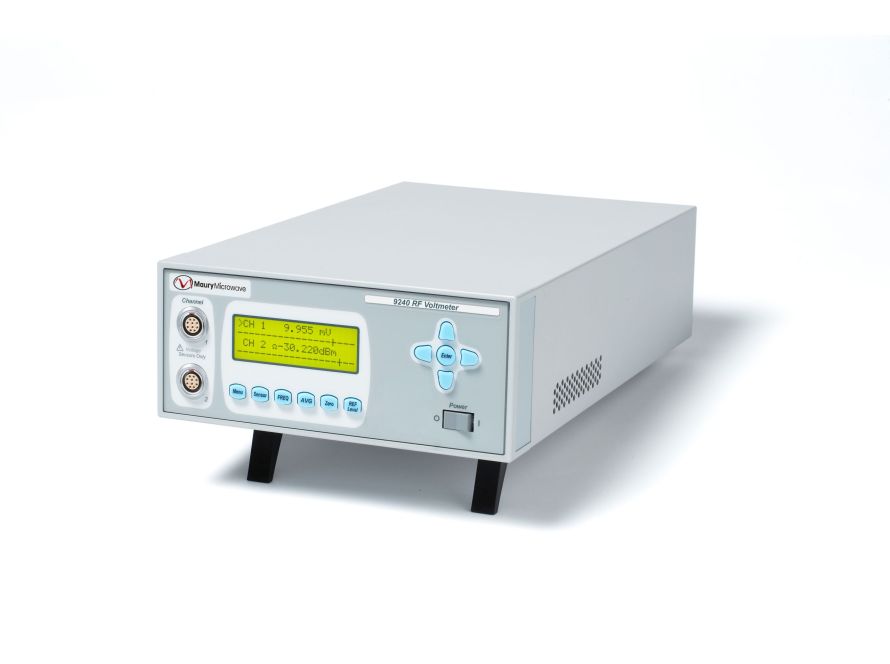Advanced RF volt meters for noise-resistant, high-precision measurements
Maury RF volt meters are engineered for highly accurate RMS voltage measurements across a wide frequency range. With full-scale sensitivities down to microvolt levels, they are ideal for applications that demand stable, repeatable results. Built-in features like digital readout, auto-zeroing, and auto-ranging make operation simple while ensuring dependable performance across test and calibration environments.

Power Measurement FAQs
Our RF & Microwave FAQ page addresses common questions related to the fundamentals of power measurement with direct, straightforward responses. Check out this dedicated resource for quick and convenient power measurement answers.
Why is it necessary to measure RF power of a system?
From radar to 5G communications networks, common use-cases that require measuring the RF power of a system include proof-of-design, satisfying regulatory specifications, adhering to safety limits to protect against the dangers of high-power RF radiation, system efficiency, and component protection.
How do diode detector-based RF test instruments measure RF power?
A diode-based power sensor uses high-frequency diodes to rectify the RF signal to a DC voltage signal. Proportional to the amplitude of the RF signal, this voltage is captured near the signal source. Instruments like an RF power meter can measure and scale the DC voltage to reveal desired power measurements. The relation between the DC voltage and power result depends on whether the diode operates in the square-law, transition, or linear region.
What is a peak power sensor?
Peak power sensors have a small smoothing capacitance and use a low-impedance load across the smoothing capacitors to discharge rapidly when the RF amplitude drops. This means that peak power sensors can deliver quick rise times and wide video bandwidths.
Peak power sensors have triggering capabilities, which allow them to synchronized pulse measurements. When choosing a peak power test solution, engineers should consider a sensor’s video bandwidth to accurately track a signal’s envelope power, rise time to capture a pulse’s rising edge, time resolution to verify pulse shape and timing, and crest factor/statistical measurements to assess component linearity.
What is an average power sensor?
Average power sensors operate in the square-law region where the DC voltage output is closely proportional to the square of the applied RF voltage. These sensors, therefore, deliver accurate and reliable average power measurements despite the presence of modulation.
Video bandwidth and the ability to track a signal’s profile are less of a concern when selecting an average power sensor, since these instruments are only used to measure average power over time and instantaneous envelope results are not required.
Related Resources
03
Key Sensor Capabilities for Precision Timing in 5G TDD Networks
Time-division duplex (TDD) schemes enable 5G wireless systems to deliver next-generation performance. This article explores the essential capabilities for test instrumentation to characterize the performance of high speed switches in 5G TDD networks.
Latest News & Blogs
How Does Connector Care and Cable Phase Stability Impact Test Results?
RF and connectors are essential in test setups, but simple oversights, such as using incompatible connector interfaces or careless storage, can degrade performance and cause costly equipment damage. In this…
How Can Color-coded Connectors Prevent Costly Mistakes in the Lab?
RF and microwave test labs are dynamic environments with connectors everywhere. They’re found on cable assemblies, precision adapters, and attenuators, requiring the right torque wrenches to secure connections. With many…
What Is Pulse Compression Radar and What’s Needed to Test It?
From surveillance operations to mission-critical defense systems, pulsed radar is central to various applications requiring precise target information, such as range and velocity. In this blog, we’ll explore how pulsed…
How Do You Power Reliable EMC Immunity Testing?
Electromagnetic compatibility (EMC) testing ensures that electronic devices operate as intended in dense wireless environments without causing or being significantly affected by interference. EMC standards are pivotal across various industries,…


